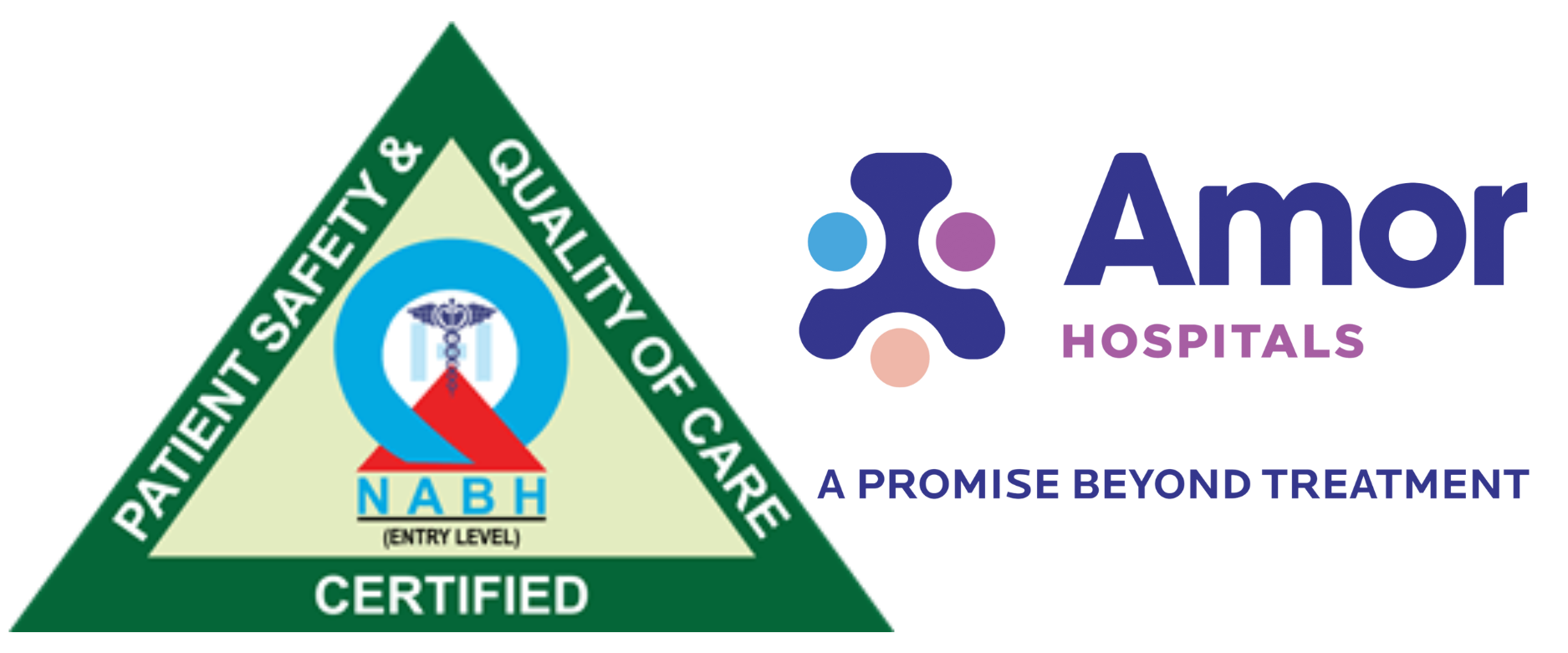Book an Appiontment
Get a consultation from experienced doctors equipped with advanced technology diagnosis & treatment procedures.
24 / 7 Helpline
+91 40 6606 9999
Best Oncology Hospital in Hyderabad
Oncology is emerging to be major non communicable disease in the world and India shares a significant disease burden. Treating Cancer not only needs world class expertise but also lot of empathy. Though thought to be incurable, cancer can be cured when detected at early stage. At Amor Hospitals, Hyderabad Department of Oncology provides comprehensive care using a multi-disciplinary approach to treat cancers both solid tumours and liquid tumours. Our team consists of specialists in the field of Radiation Oncology, Surgical Oncology, Medical oncology. Along with able and efficient physician team patient care involves nutritionists, palliative care specialists & physiotherapists to provide good quality of life to the patients at different stages of cancer. We ensure compassionate patient care and our procedures are aimed at maximum organ conservation without compromising the safety of the patient, ensuring faster recovery time and return to normal life at the earliest. Our team of oncologists take the time to discuss with each patient the diagnosis and treatment options available to them, answering their questions and concerns. including nutrition, rehabilitation, to anticipate and manage the side effects of treatment.
Treatments offered by Amor
Medical oncology is one of the major cancer treatment modalities, and it uses systemic treatment approaches, such as Chemotherapy, Immunotherapy, Targeted Therapy and Hormonal Therapy to manage cancer effectively. These systemic therapies help destroy cancer cells present throughout the body. They are often administered in combination with other treatment modalities like surgery and radiation therapy for best clinical outcomes among the patients. Our experts in medical oncology provide expert services in medical oncology in an environment that is designed to cater to your needs. We are focussed on treating all types of cancers with personalized treatment approaches. We are towards the prevention, screening, diagnosis and treatment for a wide range of cancers through cutting-edge technology and personalized multimodal treatment protocols. Apart from inpatient chemotherapy facilities, the department has also made outpatient and ambulatory chemotherapy facilities available for patients via specialized chemoports. We manage both solid tumours and liquid tumour disorders whilst preserving the quality of life among both adult and pediatric patients. Our areas of care include: • Gynecological Oncology • Gastrointestinal Cancer • Breast Cancer • Lung Cancer • Skin Cancer • Bone Cancer • Eye Cancer • Mouth Cancer • Brain Cancer • Head & Neck Cancers • Prostate Cancers
Chemotherapy is a cancer treatment approach under medical oncology that uses powerful drugs to destroy cancer cells throughout the body. It usually works by keeping the cancer cells from growing, dividing, and making more cells. Because cancer cells usually grow and divide faster than normal cells, chemotherapy has more of an effect on cancer cells. However, the drugs used for chemotherapy are powerful, and they can still cause damage to healthy cells such as those in the lining of the mouth and intestine and hair follicles. This may cause a few mild to moderate side effects among patients during and for a short period after the treatment. Usually, these side effects wear off with time. However, in a few cases where the side effects are severe, oncologists recommend medications to manage them.
Immunotherapy is a personalized treatment approach that boosts the body’s natural defenses to fight cancer. It uses substances made by the body or in a laboratory to improve how your immune system works to find and destroy cancer cells. In this type of treatment the body’s immune cells are stimulated to launch an attack against cancer cells. Immunotherapy works against cancer through multiple mechanisms: • Stimulating the immune system to recognise and attack cancer cells • Triggering immune cells to kill cancer cells through complex immunological mechanisms • Administering specialized components that enhance the immune response against cancer cells Various personalized approaches are used to reprogram the immune system among cancer patients: 1. Monoclonal Antibody Therapy: Monoclonal antibodies are lab-generated antibodies that could work by blocking the division of cancer cells or triggering the immune system to attack and kill cancer cells. Checkpoint inhibitors are a special class of monoclonal antibodies that work by blocking the proteins, which stop the immune system from acting against cancer cells. 2. Dendritic Cell Therapy: During this procedure, the dendritic cells are extracted from the patient’s body and are reengineered in the laboratory. Later, these modified dendritic cells are injected back into the patient’s body. Upon entering the immune system, these modified cells launch an attack on cancer cells and kill them. 3. T-cell Therapy: T-cell therapy involves modified T-cell, which is one of the immune cell types. The T-cells are extracted, modified and injected back to the patient’s body where they target and destroy cancer cells. 4. Oncolytic Virus Therapy: Oncolytic virus therapy is another form of immunotherapy wherein a special type of virus is injected into the body of the cancer patient. These viruses kill cancer cells without harming the healthy cells. 5. Cytokine Therapy/ Immune System Modulators: Cytokines are a group of special proteins that can stimulate the immune system against cancer by regulating the growth and division of cancer cells or triggering immune cells to attack the cancer cells. Cytokines also trigger the cancer cells to produce chemicals that attract the immune cells to find and attack them. 6. Cancer Vaccine: Cancer vaccines are used for both the prevention and treatment of cancer. These vaccines may contain dead cancer cells or protein components from cancer cells. Cancer vaccines work by triggering the immune system to produce antibodies against cancer cells.
Targeted therapy is a form of precision cancer treatment under medical oncology. Targeted therapy uses drugs to target specific genes and proteins that are involved in the growth and survival of cancer cells. Targeted therapy can affect the tissue environment that helps a cancer grow and survive or it can target cells related to cancer growth, like blood vessel cells. Therefore, before administering the targeted therapy, a thorough assessment of the tumour microenvironment is performed. Studying the tumour microenvironment helps oncologists understand the tumour behaviour and accordingly plan the treatment. Targeted therapy attacks cancer cells via multiple mechanisms: • It may block the chemical signals that are responsible for the growth and multiplication of cancer cells • It may change the proteins in cancer cells and lead to their death • It may also block the production of new blood vessels and thereby stop feeding the cancer cells • Targeted therapy may stimulate the immune system to launch an attack against cancer cells • It may deliver toxins to cancer cells to destroy them while sparing the healthy cells.
A few cancers need hormones to grow or multiply – these cancers are either called hormone-dependent or hormone-sensitive cancers. Hormone therapy or endocrine therapy is a type of cancer treatment that removes, blocks, or adds specific hormones to the body. It uses specific drugs to block certain hormones or reduce their levels in the body to stop the growth of cancer cells or delay the disease progression. Just like other systemic therapies, hormone therapy is combined with other treatment modalities like surgery or radiation therapy. This helps in enhancing the overall effectiveness of the treatment given. Following are the cancers that can be treated with hormone therapy: • Breast Cancer • Prostate Cancer • Ovarian Cancer • Uterine Cancer (also called Endometrial Cancer)
Radiation Oncology is the branch of cancer therapy that is the use of high-energy radiation to damage cancer cells' DNA and destroy their ability to divide and grow. It may be delivered using machines called linear accelerators or via radioactive sources placed inside the patient on a temporary or permanent basis. Radiation therapy may be used to cure cancer, to relieve a cancer patient's pain or alleviate other symptoms. Radiation therapy can be used alone or as an adjunct therapy along with surgery and chemotherapy for the management of cancer. More than half of cancer patients are treated with radiation at some time during their course of treatment. Radiation therapy works because the radiation destroys the cancer cells' ability to reproduce, and the body naturally gets rid of these cells. Radiation affects cancer cells by damaging their DNA, so that the cancer cells can no longer divide and grow. Radiation is most effective at killing cells that are actively dividing. Cancer cells are more vulnerable to radiation for two reasons: • They divide more rapidly than normal cells • They do not repair this damage as effectively as normal cells.
Surgical oncology is the field of cancer care that focuses on surgery to diagnose, stage and treat cancer, and to manage some cancer-related symptoms. Our surgeons and surgical oncology teams at Amor hospitals have years of experience in performing surgical procedures for many types of cancer, including advanced and complex tumors. Our patient care also includes the use of palliative surgeries to control pain, increase your comfort level and improve your quality of life. Minimally invasive surgical techniques may involve: • Laparoscopy: A surgical oncologist will make a few small incisions and insert a laparoscope—a thin tube with a tiny camera attached to it—into one of the incisions to capture an interior image, while inserting surgical tools into the other incisions to excise malignancies and surrounding tissue. • Laser surgery: The surgeon will use a narrow beam of high-intensity light to remove a tumour. • Cryosurgery: The surgeon will use liquid nitrogen to freeze and kill cancer cells. Other procedures, such as endoscopies, embolization, Mohs micrographic surgery and pleuroscopies, may be performed by non-surgeons, including dermatologists, radiation oncologists and interventional pulmonologists, depending on the procedure. Non-surgical treatments may take place before surgery (neoadjuvant therapy) or after surgery (adjuvant therapy) to help prevent cancer growth, metastasis or recurrence. The treatments may include chemotherapy, radiation therapy or hormone therapy. Cancer surgery is used to treat a wide range of cancers, depending on their location, size and stage. The multidisciplinary teams at Amor hospitals will discuss with you, and one another, the specific indications of your diagnosis and advise you on an individualized course of action tailored to your needs and treatment goals. Some cancers that are commonly treated with surgical oncology include: • Breast cancer • Colorectal cancer • Endocrine cancer • Gastric cancer (stomach cancer) • Gynecological cancers • Head and neck cancers • Lung cancer • Melanomas and skin cancer • Pancreatic cancer • Sarcomas
250
Beds
6
Advanced Operation Theatres
66
Intensive Care Units
6
Clusters in OPD Block
Why Choose Amor
Amor is the Best Oncology Hospital in Kukatpally Hyderabad. We Specializes in Medical, Radiation, and Surgical Oncology. We also Specialize in Orthopaedic Oncology.
Patients Love


Best hospital in Kukatpally Amor hospitals specifically for emergency care . The staff was extremely professional and ready for most requests.


My grandmother was at Amor hospital for Knee Care and we received the most exceptional care and service from the amor hospital team.


Referred known person for Urinary bladder problem. Dr Praneeth done fabulous surgery at affordable cost. Got good feedback.


Orthopedic mr, kishor Reddy doctor Amor Hospital, Kukatpally, in my view is a hospital par excellence with top-notch doctors, very caring.


Best hospital for accident treatment 24x7 emergency and critical care team is available The human connect and the professional acumen.


Very Good hospital and Dr. Kishore B Reddy is a great doctor with kind human being. I have operated here cancer surgery in knee.


Dr. Kishore B Reddy sir is the first surgeon that I encountered with. The way sir treats the patient is really awesome.
Frequently Asked Questions
Chemotherapy is used in different ways at different times. These include: • Before surgery or radiation therapy to shrink tumours. This is called neoadjuvant chemotherapy. Neoadjuvant chemotherapy may help in downstaging the disease, enhancing the patient’s tolerance and response to the surgery or radiation therapy, reducing the recurrence rates and improving the overall survival rates. • After surgery or radiation therapy to destroy any remaining cancer cells. This is called adjuvant chemotherapy. Adjuvant chemotherapy helps reduce the risk of recurrence and improve the chances of a positive clinical outcome. • As the only treatment. For example, to treat cancers of the blood or lymphatic system, such as leukaemia and lymphoma. • For cancer that comes back after treatment, called recurrent cancer. • For cancer that has spread to other parts of the body, called metastatic cancer. The goals of chemotherapy depend on the type of cancer and how far it has spread. Sometimes, the goal of treatment is to get rid of all the cancer and keep it from coming back. If this is not possible, you might receive chemotherapy to delay or slow cancer growth. • Delaying or slowing cancer growth with chemotherapy also helps manage symptoms caused by the cancer. Chemotherapy given with the goal of delaying cancer growth is sometimes called palliative chemotherapy. In recent times, oncologists are also adopting innovative chemotherapy approaches such as metronomic chemotherapy, wherein chemo drugs are administered in low doses over a long period, this approach is being used for patients who cannot tolerate high dose chemotherapy sessions.
A radiation oncologist may use External beam radiation therapy or brachytherapy to treat cancer. External beam radiation therapy can be generated by a Linear Accelerator (a machine that accelerates electrons to produce x-rays or gamma rays). Radiation therapy given by radioactive sources that are put inside the patient is called brachytherapy. The radioactive sources are sealed in needles, seeds, wires, or catheters, and implanted directly into or near a tumour on a temporary or permanent basis. Brachytherapy is a common treatment for cancers of prostate, uterus, cervix or breast. Some cancer patients may be treated with radiation as their primary treatment. In some cases, radiation therapy is given at the same time as chemotherapy. Chemotherapy used with radiation therapy can improve the local response and reduce metastatic disease. In other cases, radiation therapy is given before (neoadjuvant treatment) or after (adjuvant treatment) surgery. Preparation for radiation therapy is focused on targeting the radiation dose to the cancer as precisely as possible to minimize side effects and avoid damaging normal cells. Types of Radiation Oncology Using a linear accelerator or a high energy x-ray machine, targets the powerful radiation beams on the tumour in the body. This is the standard technology of radiation therapy. Some forms of cancers may however use radiation that can be directed internally to target the tumour more accurately. The Department of Radiation Oncology at Amor Hospitals Kukatpally Hyderabad, has specialists who are experts in the following types of radiation therapy: - External Beam Radiation Therapy: This therapy procedure uses an external machine, to target the tumour with radiation beams. The subtypes of this includes: The types of external-beam radiation therapy are: Three-dimensional conformal radiation therapy (3D-CRT). Detailed 3-dimensional pictures of the cancer are created, typically from computed tomography (CT) or magnetic resonance imaging (MRI) scans. This allows the treatment team to aim the radiation therapy more precisely. It often means that they can safely use higher doses of radiation therapy while reducing damage to healthy tissue. This lowers the risk of side effects. For instance, dry mouth is common after radiation therapy for head and neck cancer. But 3D-CRT can limit the damage to the salivary glands that causes dry mouth. Intensity modulated radiation therapy (IMRT). This is a more complex form of radiation. With IMRT, the intensity of the radiation is varied within each field unlike conventional 3D-CRT, which uses the same intensity throughout each beam. IMRT targets the tumour and avoids healthy tissue better than conventional 3D-CRT. Volumetric Modulated Arc Therapy (VMAT) uses photons (W-rays) generated by a medical linear accelerator. Very small beams with varying intensities are aimed at a tumour and then rotated 360 degrees around the patient. This results in attacking the target in a complete three-dimensional manner. Internal Radiation Therapy: Internal radiation therapy is also called brachytherapy. This type of radiation therapy is when radioactive material is placed into the cancer or surrounding tissue. Implants may be permanent or temporary and may require a hospital stay. Types of internal radiation therapy include: Permanent implants. These are tiny steel seeds that contain radioactive material. The capsules are about the size of a grain of rice. They deliver most of the radiation therapy around the implant area. But some radiation may exit the patient’s body. This requires safety measures to protect others from radiation exposure. Over time, the implants lose radioactivity. And the inactive seeds remain in the body. Temporary internal radiation therapy. This is when radiation therapy is given in one of these ways: • Needles • Tubes, called catheters that carry fluid in or out of the body • Special applicators What are other radiation therapy options? Intraoperative radiation therapy (IORT). This treatment delivers radiation therapy to the tumor during surgery using either external-beam or internal radiation therapy. IORT allows surgeons to move away healthy tissue in advance. This treatment is useful when vital organs are close to the tumour. Systemic radiation therapy. Patients swallow or receive an injection of radioactive material that targets cancer cells. The radioactive material leaves the body through saliva, sweat, and urine. These fluids are radioactive and people in close contact with the patient should take the safety measures recommended by the health care team. An example of this is radioactive iodine therapy (RAI; I-131) for thyroid cancer. Radioimmunotherapy. This is a type of systemic therapy. It uses monoclonal antibodies, which are proteins that are attracted to very specific markers on the outside of cancer cells, to deliver radiation directly to the tumors. Because the treatment uses these special antibodies, there is less effect on surrounding normal tissue. An example is ibritumomab (Zevalin), which is used in the treatment of some lymphomas. Radiosensitizers and radioprotectors. Researchers are studying radiosensitizers. These are substances that help radiation therapy better destroy tumors. Radioprotectors are substances that protect healthy tissues near the treatment area. Examples of radiosensitizers include fluorouracil (5-FU, Adrucil) and cisplatin (Platinol). Amifostine (Ethyol) is an example of a radioprotector.
There are many reasons someone with or suspected of having cancer may undergo surgery. Surgical oncology may be used to: • Diagnose cancer (diagnostic surgery or biopsy) • Remove a tumor or a portion of the cancer (curative or debulking surgery) • Determine where the cancer is located, whether it has spread and whether it is affecting the functions of other organs (staging surgery) • Remove body tissue that may become cancerous (preventive surgery) • Support other types of treatment, such as installing an infusion port (supportive surgery) • Restore the body's appearance or function (reconstructive surgery) • Relieve side effects (palliative surgery)
There are two primary types of cancer surgery: open surgery and minimally invasive surgery. In open surgery, the surgical oncologist will make a large incision, usually to remove all or part of a tumour and some of the surrounding healthy tissue (margins).




